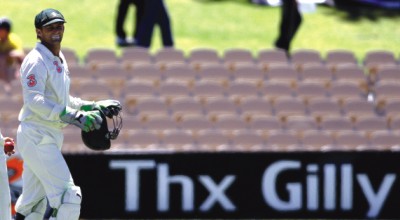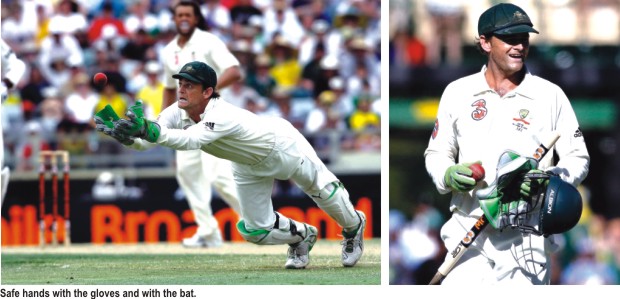|
Sport
The Gloves
are Off
Nader Rahman
 |
The sign says it all. |
Usually when it comes to Australian cricketers I keep my thoughts to myself, being a diehard West Indies fan I am used to the sort of humiliation they can dish out and thus I have found it easy to treat them with disdain. But this week with the announcement that Adam Gilchrist was retiring from all forms of cricket I found it surprisingly easy to pay homage to the archetypical modern cricketer, aggressive and multi talented with a never- say-die attitude he was one for the ages and I am embarrassed to say I will grudgingly miss him.
My memories of Gilchrist are a collage of images from the last decade, the impregnable decade of Australian dominance. Like most other Australian cricketers he did not burst on to the international scene as a tear away youngster, he had more than a few seasons behind him by the time he eased himself into the national team. By the mid nineties the tiniest of cracks in Ian Healey's armour were beginning to show. Missing that crucial stumping of Inzamam off Warne's bowling against Pakistan in Karachi in 1995 is the one that sticks in my memory. It sealed a one wicket win for the hosts, in the most heartbreaking circumstances. He was never blamed for the defeat nor should he have been, but that was when the talk of two separate teams for ODI's and Tests was first being heard and Healey's position in the shorter version of the game looked most as risk. He held on to his dual positions for another two years before Gilchrist was first sighted.
By the end of '96 it was time for change and there seemed to be only one contender for Healey's position and it was Gilchrist. He slowly made his way into the ODI team with a few scattered matches but by the Ashes summer of '97 he was well and truly Australia's first choice ODI wicket keeper. On May 24 1997 Ian Healey played his last ODI as Gilchrist played his 9th and that day was more than a formal changing of the guard, at the home of cricket Gilchrist flayed a 50 ball 53 in a counter attacking innings that would be the hallmark of his batting and the sport which he helped change. Healey was still good enough to keep his place in the test team, but the rate at which the game was changing he would do well to hold off a charge from Gilchrist.
By 1998 he was reasonably well known having thrashed two ODI centuries in three matches against South Africa and New Zealand, the latter making a mockery of a rather good attack. Yet he was still not considered a 'force ' in the international game. That year I framed my first real memory of him. The mini world cup had brought every test nation to Dhaka and barely into double figures, I parked myself outside their hotel scrapping for every autograph I could get. As it so happened, a family friend was asked to interview Clive Lloyd and I tagged along to add to my burgeoning autograph collection. As we stepped into the hotel the Australian team was leaving for a net and I found myself all of four and a half feet tall standing between the colossus like Matthew Hayden and the Glen McGrath. I was well and truly star struck, twirling a Australian rules football on his index finger McGrath looked down and asked me more politely than he has ever done to any international batsmen "what's up?" I had no answer, my mind went blank and I was only rescued by one Adam Gilchrist. He walked up, put an arm around me, and asked if anyone was giving me any trouble. I vaguely remember hearing them laugh, as I shook my head in disagreement. I held out my autograph book as they took turns to sign it, he rubbed my head and ruffled up my hair and left.
A year after that he was officially declared one of the deadliest batsmen in the world and would pick up his first of three World Cup medals. In the final of '99 he smote a 33 a ball fifty to round off an unbelievable performance from Australia, after having been on the brink of elimination they stormed through to take the title proving that they were the premier side in international cricket. By then Australia had built up the reputation and aura of invincibility in the One Day game, they were fast approaching that status in the longer format of the game as well. At the end of the year Healey stepped down from the test spot and now Gilchrist had to prove there was more to his game than simply a blazing knock. Healey's last test against Zimbabwe was the first in a world record streak of 16 consecutive test match victories for Australia, thus it would be quite a while before Gilchrist knew the bitterness of defeat.

On his debut he stroked a fluent 81 and it did not take too long before he showed his mettle. In his second test against Pakistan at Hobart Australia were left chasing a monumental 369 to win and at 126 for 5 the game looked as good as gone. In stepped Gilchrist and he proceeded to take the Pakistani bowling to the cleaners. In only his second test he racked up a sublime 149 off only a 163 balls in a 238 run partnership which went along at over four runs an over, a scandalous run rate at that time. Little did the world realise that the run rate and the aggression with which they chased would dominate world cricket for the next decade. My diehard Pakistan supporting friends cursed him, he should have been given out early on in his innings but was not, I told them to appreciate an innings of quality and to this very day they still give me that “I don't care” stare back at me when I say that. I remember the innings vividly it was something I won't soon forget.
He was soon blazing double centuries and scoring runs galore thereby reshaping world cricket. He epitomised what it was to be a modern cricketer, aggressive, fast scoring and always on the move. Every keeper in the world paled in comparison to him, he was quite simply the ultimate package and redefined what it meant to be a keeper/batsmen. No longer could one get away with simply being a good keeper, one had to be an outstanding batsmen capable of holding his place if one was truly to be accepted. Gilchrist changed how the word all-rounder was used, once the bastion of simply the bowlers and batsmen he was readily being called the best all-rounder in the world. In 2002 in three tests against South Africa he had scored a double hundred, a hundred and ninety and was on top of the world rankings for batsmen. I fondly remember that time watching him invent batsmenship with shots like the uppercut played when on both knees on the ground guiding a shortish ball over the slips. He was a sight to behold and with his performances Australia kept their winning juggernaut rolling along that was until 2001 when their streak of 16 wins in a row was ended when he scored his first pair in that unforgettable match at Calcutta. After seeing him smote an 84 ball hundred in the first test of the series I was determined to watch him in Calcutta, eventually I could not make it but I still remember that match like it was yesterday. Gilly's first flop and Australia loses, it was easy to seewhy he was so important to the team.
The next few years he continued to plunder attacks all over the world including a startling run of form in early 2005 when he scored three centuries in consecutive matches against Pakistan and New Zealand. By then his average was still well over 50 and his keeping remained impeccable. But 2005 was to be a tough year for him, Australia went though a tough Ashes campaign where his slanted back lift was taken apart by Andrew Flintoff. He seemed a shadow of himself and what I remember best from that English summer is him collecting a leg bye against Bangladesh at Cardiff and hurling that ball back for a run out. Bangladesh had beaten the mighty Australians, I still cant get that image out of my head, Mohammed Rafique scampering back to win the match and Gilchrist trying in vain. He would have his revenge on us soon enough but after a torrid Ashes his confidence was shot to pieces.
His One Day from went through a patchy spot as well and it all started to show in his keeping. His normally safe hands were prone to a miss every now and then, something unheard of just a few months ago. When Australia came to Bangladesh in 2006 people were predicting two day test matches and absurd score lines, they were right in one way or another. Gilchrist played one of the finest knocks in test cricket when he scored 144 in an innings so good even the partisan home crowd gave him a standing ovation. After Bangladesh had managed over 400 in the first innings, Australia was in deep trouble at 93 for 6, a follow on looked very likely and did an embarrassing test defeat to Bangladesh. Out of the next 176 runs scored Gilchrist scored 131 to be the last man out in an innings of sheer class. He did not hold back from his attacking style as he placed many a ball over the midwicket stands. I sat in the bleachers cursing him with my friends, but I could not take my eyes off him. We were so close to success and the dividing line was his broad bat, I cursed him over and over again. But the innings was a thing of beauty, which even I could not deny. Australia went on to win the match and within a few weeks that innings was forgotten.
While the runs did not dry up altogether his form became patchier as his average dipped below 50. In his final two seasons he only scored two more international centuries and what fine knocks those were. There was a 57 ball blitzkrieg against England, the second fastest test century of all time and a sublime 149 in World Cup final last year. When the dust has finally settled Gilchrist will retire with over 800 international dismissals, nearly 15,000 international runs and 30 centuries, staggering figures from one of the modern greats. But his place in cricket cannot simply be measured through statistics, he is the standard by which all future keepers will be measured by.
There was a time when I was on the phone all night, every night, arguing over what the best all time test XI would be and for me only two names were automatic choices Bradman and Gilchrist. People may disagree with me, they may say Tallon, Grout, Knott, Dujon, Marsh and Healey but all I'll ever say is Gilly, he is simply better that anything that has come before him and probably better than everything that will follow. It is hard to admit, but I'll miss him and for now at least I guess the gloves are off.
|
Copyright (R) thedailystar.net 2008
|
